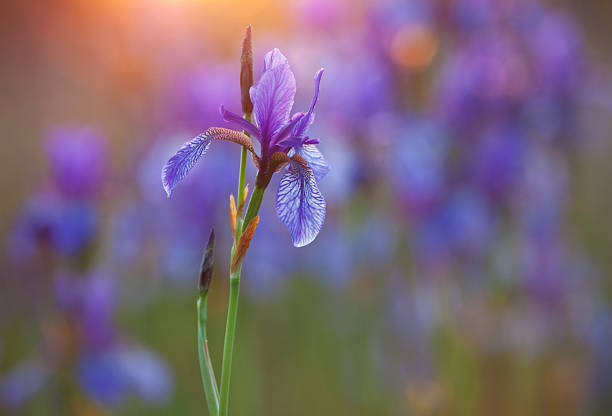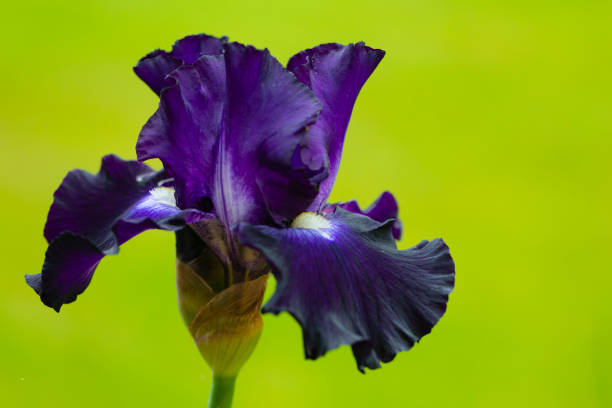Are Irises Deer Resistant?
According to the list compiled with input from nursery and landscape professionals, Rutgers New Jersey Agricultural Experiment Station (NJAES), and associates, irises are rated as “rarely damaged” by deers. They don’t like smelly plants with strong smells. Bearded irises are one of the “stinky” plants that deer don’t like, so they tend to stay away from them. Irises do also have a high level of poison and a bad taste.
Like the popular Bearded Iris, Siberian Iris is also deer-resistant. Many gardeners are drawn to Bearded Irises because they come in nearly every rainbow color. Siberian Iris blooms may not come in as many hues, but they’re still as colorful as you’d expect. Siberian Iris blooms in various colors, including deep blue, rich purple, lemon yellow, and even some that look tie-dyed! These hardy perennials have tall grass-like leaves and bloom in the early summer! Both in a planting bed and along the shoreline, Siberian Iris thrives.

Table of Contents
Plants That Deer Hate
Toxicity is the primary reason deer avoid a plant. Deer won’t eat a plant if it’s poisonous. In addition, deer will avoid a plant if it doesn’t taste good to them. Because they don’t like the taste, they won’t eat iris. Last but not least, deer aren’t fans of plants with a strong odor. For the same reason that people are drawn to them, they try to avoid them.
Deer can be poisoned by daffodils and poppies, for example. These aren’t going to kill them, but eating them will make them sick and nauseous.
When it comes to plants that aren’t appealing to deer, the bearded iris is one of the best examples. To them, both lavender and peonies smell bad, which is the same reason.
Cacti and lamb’s ears are also off-limits because they are averse to being pricked.
It’s important to keep in mind that deer will eat anything they can get their hands on when hungry. They may not find your iris appealing, but if they’re hungry, they’ll eat some. Things are quite different when it comes to poisonous plants. The deer will try to avoid eating toxic plants whenever possible, even if they are in need of nourishment. If it means life or death, deer will eat anything.
Bulbs Deer Hate
There are many different reasons why flower bulbs deter deer, but the majority of them have to do with the physical characteristics of the plants themselves. Some of the reasons why deer will avoid a plant include the following:
- Deer hate plants with distinctive flavors and scents. Deer, like humans, are not likely to eat something that doesn’t taste or smell good unless they are in desperate need of food.
- Pickers and thorns are found on specific plants. If food is painful to consume, it is generally considered safer than food that is not. The same can be said for plants with hairy leaves, as well. Unpleasant to the throat and unappetizing to the taste buds.
- Plants with thick or poisonous sap are classified as toxic. Nature provides these characteristics to keep predators at bay; in the majority of cases, this is effective with deer.

Deer-Resistant Gardening: How to Create One
Deer rarely damage irises because of some reasons. Still, they do cause damage. To help you avoid such nuisance, here are some tips for building a deer-resistant garden for your irises:
Fencing
An obvious solution is to construct a wall around your property. The installation of a fence 7 feet tall should be considered a must-do if the option exists. The deer won’t be able to get over it, so your garden is safe for the time being. This can be prohibitively expensive. Therefore, if a more affordable and natural solution is desired, consider using plants as a defense.
It may be worthwhile to experiment with a combination of resistant and regular plants. The result is that deer will eventually bite down on an iris instead of a tulip, and from that point on, they will avoid eating tulips. This type of strategy can be applied to any number of plants. Deer are particularly fond of tomatoes and cucumbers, so you should take precautions to keep those vegetables safe.
Your plants are also most vulnerable during the first few weeks of their lives when they are most vulnerable. They are extremely nitrogen-dense when they are first planted. When allowed to eat your plants, the local deer will be particularly aggressive in their pursuit of them.
Deer Stay Away From Humans
When it comes to protecting your garden from deer, this is an extremely important fact to keep in mind. Deer are less likely to eat more visually appealing plants if you move them closer to your home. They are intelligent enough to recognize a human, which is why the presence of a scarecrow may cause them to flee.
Motion-Operated Sprinklers
We only recommend using motion-activated sprinklers if you are certain that they will not harm your plants. However, deer will be scared away by them! Due to the fact that the majority of these sprinklers use infrared technology, the deer will activate them at all times of the day and night. Deer will flee if they see a pipe burst out of the ground in your garden and start spraying water all over the area.
Deer Repellents
A deer repellent is an extremely effective product. In most cases, deer who are trying to hold a feast in your garden will be able to smell it. If they succeed, they will most likely turn around and leave. Deer do not like garlic, so if they continue to infest your garden, the repellant will work to keep them away! Please ensure that the repellant you purchase has been thoroughly tested.
The bottom line is that deer do not like iris species. If they are hungry, they will eat these plants, but they would prefer to avoid them if given the opportunity. Additionally, there are many other plants that deer will not consume. For example, some plants are toxic to them, while others have a bad taste, while others have an unpleasant texture and are painful to consume. Deer-resistant plants should be mixed with plants that deer will eat if you want to make your garden deer-proof.
Man-made solutions, such as fences, deer repellants, and scarecrows are wise choices. As a bonus, deer are known to avoid dogs, so there’s always that!
